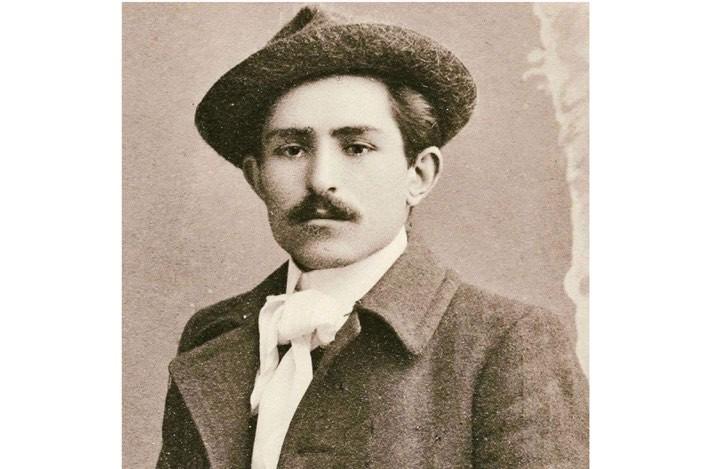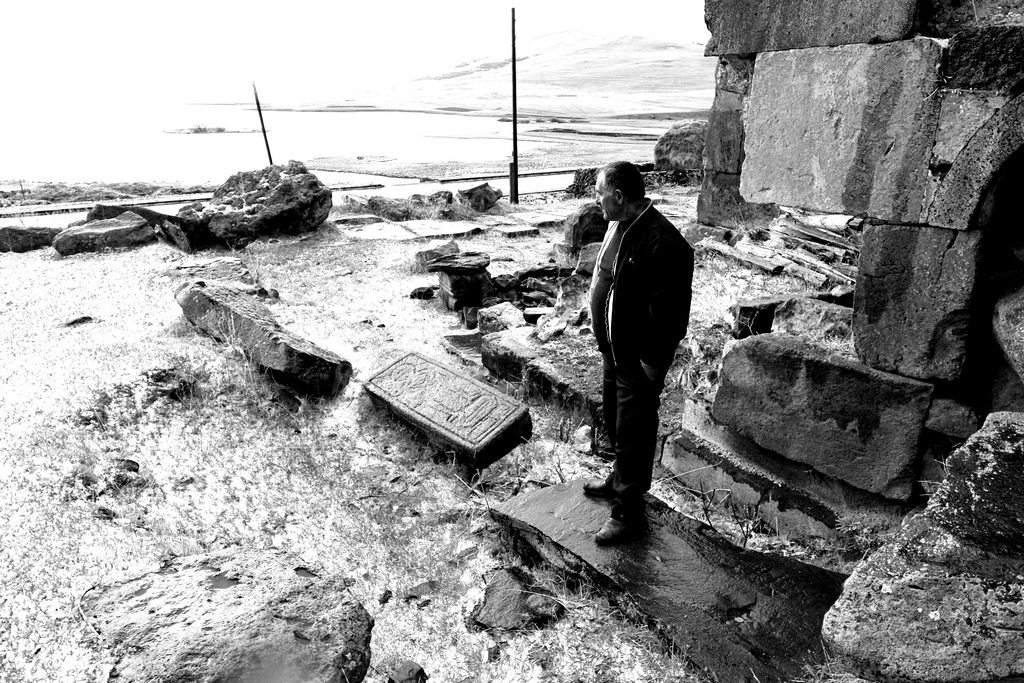Re: The Struggle in Javakhk
GEORGIE : LE PRESIDENT SAAKACHVILI INSTAURE UN CLIMAT ANTI-ARMENIEN
Publie le : 30-01-2013
Info Collectif VAN - www.collectifvan.org - En Georgie, "la liberation
des prisonniers politiques et autres personnes amnistiees, parmi
lesquelles Vahakn Chakhalyan, a provoque des reactions negatives
au sein du Mouvement National Uni qui se trouve actuellement dans
l'opposition. Ces derniers jours et durant toute la semaine, plus
particulièrement durant la journee d'hier, ses dirigeants ont profere
des propos indignes en cherchant a instaurer un climat anti armenien
au sein de la societe pluriethnique georgienne. A plusieurs reprises,
le President Saakachvili a cite le nom d'un autre prisonnier politique,
celui d'Armen Gevorgyan, que le President a aussi accuse " d'espionnage
". Le President n'aurait-il donc retenu d'une longue liste de 200 noms
de prisonniers politiques que ces deux patronymes [armeniens] et dans
quel but ?" Le Collectif VAN avait en 2010 alerte l'opinion publique
sur un racisme anti-armenien exponentiel en Georgie. Les injures
sur les " Armenoïdes de Georgie " proferees par Guram Markhulija,
professeur d'Histoire a l'Universite de Tbilissi, armenophobe notoire,
demontraient les sentiments racistes, symptomatiques des societes
gangrenees par le nationalisme. Le President Saakachvili desire-t-il
raviver en Georgie les relents de haine qui ont permis ce type de prose
: " Meme une espèce biologique semi-consciente telle que "le singe
qui se balance joyeusement sur la liane avec les travaux de Darwin
sous le bras " regarde l'Armenien, comme un parent ayant reussi. "
? Le Collectif VAN vous propose le Communique de presse du Diocèse de
Georgie de la Sainte Eglise apostolique orthodoxe armenienne en date
du 26 janvier 2013 et relaye par le Centre d'information du diocèse
de France de l'Eglise armenienne.
Legende photo : Vahakn Chakhalyan
DIOCESE DE GEORGIE DE LA SAINTE EGLISE APOSTOLIQUE ORTHODOXE ARMENIENNE
Communique du 26 janvier 2013
Le diocèse des Armeniens de Georgie exhorte le president Saakachvili
et les autres dirigeants du Mouvement National Uni (MNU) a renoncer
aux declarations provocatrices.
La liberation des prisonniers politiques et autres personnes
amnistiees, parmi lesquelles Vahakn Chakhalyan, a provoque des
reactions negatives au sein du Mouvement National Uni qui se trouve
actuellement dans l'opposition. Ces derniers jours et durant toute
la semaine, plus particulièrement durant la journee d'hier, ses
dirigeants ont profere des propos indignes en cherchant a instaurer
un climat anti armenien au sein de la societe pluriethnique georgienne.
Le President de Georgie, Mikhaïl Saakachvili, et Vano Merabichvili,
le secretaire general du Mouvement National Uni, ont declare que Vahakn
Chakhalyan, " promu " prisonnier politique, etait un " secessionniste
", un " agent de services etrangers " et un " ennemi de l'Etat georgien
".
Par de telles declarations, le President et l'ancien Ministre de
l'Interieur ont en fait reconnu que la Justice etait inexistante
lorsque le MNU etait au pouvoir. Si Chkhalyan etait effectivement un "
secessionniste " et un " agent " (etranger), alors pourquoi n'a-t-il
pas ete juge conformement aux articles du Code penal correspondant
a cette accusation ?
L'explication de cette enigme est simple: le pouvoir precedant
utilisait tout bonnement de manière très particulière l'appareil
judiciaire contre ses opposants politiques. Le President Saakachvili
s'est aussi permis de citer le nom de sa Saintete Karekine II,
Catholicos de tous les Armeniens, en affirmant que cette liberation
avait eu lieu a sa demande.
Nous voulons reaffirmer que cette requete avait avant tout un
fondement humanitaire, et qu'elle faisait suite a la demande des
parents de V. Chakhalyan, demande a laquelle le chef spirituel de
tous les Armeniens ne pouvait naturellement demeurer insensible.
Deuxièmement, dans tous les cas de figure, le dossier de Chakhalyan
relevait de l'amnistie generale puisque ce dernier avait ete condamne
sur la base des articles concernes par la " loi du 12 Janvier 2013
" portant sur l'Amnistie Generale.
Ces derniers jours, et a plusieurs reprises, le President Saakachvili,
a cite le nom d'un autre prisonnier politique, celui d'Armen
Gevorgyan, que le President a aussi accuse " d'espionnage ". Le
President n'aurait-il donc retenu d'une longue liste de 200 noms de
prisonniers politiques que ces deux patronymes et dans quel but ?
Precisons aussi que, selon nos informations, sa Saintete Illia
II, Catholicos de toute la Georgie, aurait plaide en faveur de la
liberation d'Armen Gevorgyan auprès du President Saakachvili pour
raison humanitaire.
Le diocèse de Georgie de la sainte Eglise apostolique orthodoxe
armenienne proteste contre les actes evoques et demande aux
responsables politiques de ne pas instrumentaliser au nom d'interets a
court terme les questions qui menacent très directement non seulement
la paix et la quietude de notre patrie multiethnique, mais aussi les
relations fraternelles des peuples armenien et georgien.
Nous sommes convaincus qu'independamment de tous ces soubresauts
politiques, nos peuples renforceront et approfondiront a l'avenir
leurs relations fraternelles de bon voisinage et que les Armeniens
citoyens de la Georgie demeureront, comme ils l'ont toujours ete dans
le passe, les dignes fils et filles de la Georgie.
CENTRE D'INFORMATION DU DIOCESE ARMENIEN DE GEORGIE
18, Rue Armaz - 0103 Tbilissi Georgie Courriel:
[email protected]
Centre d'information du diocèse de France de l'Eglise armenienne
GEORGIE : LE PRESIDENT SAAKACHVILI INSTAURE UN CLIMAT ANTI-ARMENIEN
Publie le : 30-01-2013
Info Collectif VAN - www.collectifvan.org - En Georgie, "la liberation
des prisonniers politiques et autres personnes amnistiees, parmi
lesquelles Vahakn Chakhalyan, a provoque des reactions negatives
au sein du Mouvement National Uni qui se trouve actuellement dans
l'opposition. Ces derniers jours et durant toute la semaine, plus
particulièrement durant la journee d'hier, ses dirigeants ont profere
des propos indignes en cherchant a instaurer un climat anti armenien
au sein de la societe pluriethnique georgienne. A plusieurs reprises,
le President Saakachvili a cite le nom d'un autre prisonnier politique,
celui d'Armen Gevorgyan, que le President a aussi accuse " d'espionnage
". Le President n'aurait-il donc retenu d'une longue liste de 200 noms
de prisonniers politiques que ces deux patronymes [armeniens] et dans
quel but ?" Le Collectif VAN avait en 2010 alerte l'opinion publique
sur un racisme anti-armenien exponentiel en Georgie. Les injures
sur les " Armenoïdes de Georgie " proferees par Guram Markhulija,
professeur d'Histoire a l'Universite de Tbilissi, armenophobe notoire,
demontraient les sentiments racistes, symptomatiques des societes
gangrenees par le nationalisme. Le President Saakachvili desire-t-il
raviver en Georgie les relents de haine qui ont permis ce type de prose
: " Meme une espèce biologique semi-consciente telle que "le singe
qui se balance joyeusement sur la liane avec les travaux de Darwin
sous le bras " regarde l'Armenien, comme un parent ayant reussi. "
? Le Collectif VAN vous propose le Communique de presse du Diocèse de
Georgie de la Sainte Eglise apostolique orthodoxe armenienne en date
du 26 janvier 2013 et relaye par le Centre d'information du diocèse
de France de l'Eglise armenienne.
Legende photo : Vahakn Chakhalyan
DIOCESE DE GEORGIE DE LA SAINTE EGLISE APOSTOLIQUE ORTHODOXE ARMENIENNE
Communique du 26 janvier 2013
Le diocèse des Armeniens de Georgie exhorte le president Saakachvili
et les autres dirigeants du Mouvement National Uni (MNU) a renoncer
aux declarations provocatrices.
La liberation des prisonniers politiques et autres personnes
amnistiees, parmi lesquelles Vahakn Chakhalyan, a provoque des
reactions negatives au sein du Mouvement National Uni qui se trouve
actuellement dans l'opposition. Ces derniers jours et durant toute
la semaine, plus particulièrement durant la journee d'hier, ses
dirigeants ont profere des propos indignes en cherchant a instaurer
un climat anti armenien au sein de la societe pluriethnique georgienne.
Le President de Georgie, Mikhaïl Saakachvili, et Vano Merabichvili,
le secretaire general du Mouvement National Uni, ont declare que Vahakn
Chakhalyan, " promu " prisonnier politique, etait un " secessionniste
", un " agent de services etrangers " et un " ennemi de l'Etat georgien
".
Par de telles declarations, le President et l'ancien Ministre de
l'Interieur ont en fait reconnu que la Justice etait inexistante
lorsque le MNU etait au pouvoir. Si Chkhalyan etait effectivement un "
secessionniste " et un " agent " (etranger), alors pourquoi n'a-t-il
pas ete juge conformement aux articles du Code penal correspondant
a cette accusation ?
L'explication de cette enigme est simple: le pouvoir precedant
utilisait tout bonnement de manière très particulière l'appareil
judiciaire contre ses opposants politiques. Le President Saakachvili
s'est aussi permis de citer le nom de sa Saintete Karekine II,
Catholicos de tous les Armeniens, en affirmant que cette liberation
avait eu lieu a sa demande.
Nous voulons reaffirmer que cette requete avait avant tout un
fondement humanitaire, et qu'elle faisait suite a la demande des
parents de V. Chakhalyan, demande a laquelle le chef spirituel de
tous les Armeniens ne pouvait naturellement demeurer insensible.
Deuxièmement, dans tous les cas de figure, le dossier de Chakhalyan
relevait de l'amnistie generale puisque ce dernier avait ete condamne
sur la base des articles concernes par la " loi du 12 Janvier 2013
" portant sur l'Amnistie Generale.
Ces derniers jours, et a plusieurs reprises, le President Saakachvili,
a cite le nom d'un autre prisonnier politique, celui d'Armen
Gevorgyan, que le President a aussi accuse " d'espionnage ". Le
President n'aurait-il donc retenu d'une longue liste de 200 noms de
prisonniers politiques que ces deux patronymes et dans quel but ?
Precisons aussi que, selon nos informations, sa Saintete Illia
II, Catholicos de toute la Georgie, aurait plaide en faveur de la
liberation d'Armen Gevorgyan auprès du President Saakachvili pour
raison humanitaire.
Le diocèse de Georgie de la sainte Eglise apostolique orthodoxe
armenienne proteste contre les actes evoques et demande aux
responsables politiques de ne pas instrumentaliser au nom d'interets a
court terme les questions qui menacent très directement non seulement
la paix et la quietude de notre patrie multiethnique, mais aussi les
relations fraternelles des peuples armenien et georgien.
Nous sommes convaincus qu'independamment de tous ces soubresauts
politiques, nos peuples renforceront et approfondiront a l'avenir
leurs relations fraternelles de bon voisinage et que les Armeniens
citoyens de la Georgie demeureront, comme ils l'ont toujours ete dans
le passe, les dignes fils et filles de la Georgie.
CENTRE D'INFORMATION DU DIOCESE ARMENIEN DE GEORGIE
18, Rue Armaz - 0103 Tbilissi Georgie Courriel:
[email protected]
Centre d'information du diocèse de France de l'Eglise armenienne










Comment